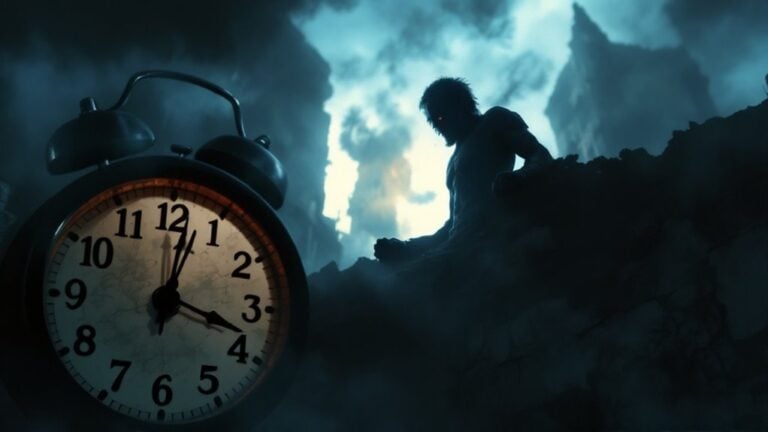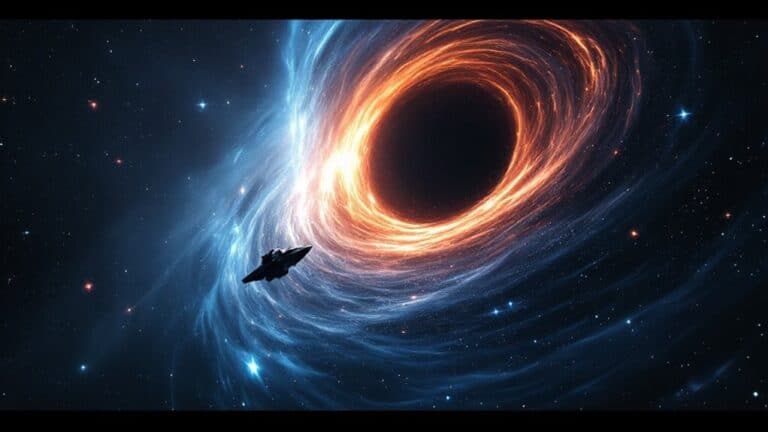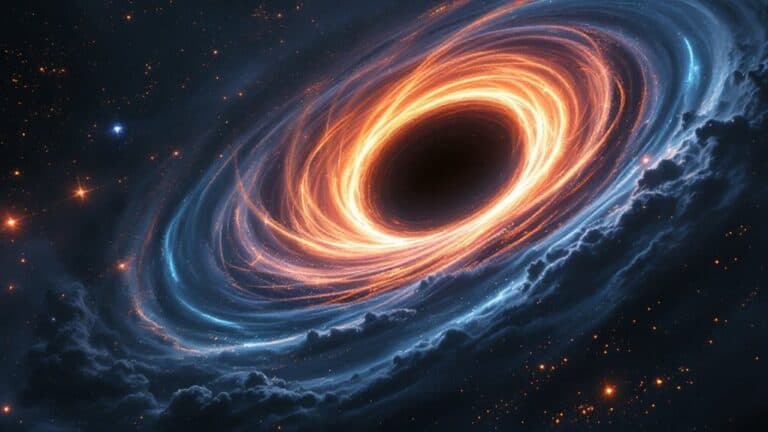Interstellar’s Exploration of Love: A Force Beyond Time and Space
In Interstellar, love isn’t just an emotion; it’s portrayed as a transcendent force that influences decisions and shapes destinies across the cosmos. You see how Cooper’s love for his daughter, Murph, drives him to confront the limitations of time and space. This emotional connection contrasts starkly with scientific rationality, creating profound tension as characters navigate ethical dilemmas. Love becomes a guiding compass amid isolation and fear, leading to sacrifices that resonate with themes of redemption. By exploring these dynamics, the film invites you to reflect on the deeper implications of love’s power beyond mere sentiment. There’s much more beneath the surface to discover.
Table of Contents
Key Takeaways
- Interstellar portrays love as a transcendent force, guiding decisions amid the challenges of time and space.
- The father-daughter relationship between Cooper and Murph illustrates love’s emotional complexities and its impact on human survival.
- Love often conflicts with scientific reasoning, driving characters like Cooper to take risks for the sake of their loved ones.
- Themes of sacrifice and redemption reveal the ethical dilemmas faced by characters, highlighting love’s power to motivate selflessness.
- Cinematic techniques emphasize love’s significance, contrasting isolation in space with the warmth of emotional connections.
Love as a Transcendent Force
In the vast expanse of space and time, love emerges as a transcendent force that defies conventional boundaries. It’s not just an emotion; it’s a powerful influence that spans across love dimensions, impacting decisions and behaviors in ways we can hardly comprehend.
Interstellar beautifully illustrates this idea, showing how love can guide actions even when faced with the formidable challenges of time and distance. Dr. Amelia Brand asserts that love might serve as evidence of a higher dimension, hinting at a reality where emotional connections exist beyond our limited understanding. Moreover, the film emphasizes how the survival of humanity is intricately linked to the characters’ emotional motivations, as the plot centers on NASA scientists seeking solutions to environmental catastrophes. The film’s meticulous emphasis on scientific precision reinforces the notion that love can coexist with the complexities of the universe.
As you reflect on the film, consider how love parallels fundamental scientific forces like gravity. It propels characters forward, shaping their paths and decisions amid uncertainty. The relationship between Cooper and Murph exemplifies this transcendent love, revealing how deep emotional bonds can motivate and sustain human endeavors, even against the backdrop of cosmic chaos.
Ultimately, Interstellar invites you to ponder love’s role as a bridge between science and emotion. It underscores the importance of connection, suggesting that while the universe is vast and complex, it’s love that truly binds us, giving meaning to our shared experiences across time and space.
Central Relationships in Interstellar

Central to Interstellar are the relationships that define the characters and drive the narrative forward.
The father-daughter dynamics between Cooper and Murph exemplify love’s power, showcasing emotional resonance that echoes throughout the film. Their bond is complex, filled with moments of anger and longing, as Cooper’s decision to leave Earth stems from his deep love for Murph. This relationship ultimately reflects humanity’s struggle for survival amid resource depletion as they both seek hope in their connection. The urgency of their situation is heightened by the fact that time dilation complicates their reunion, making their emotional struggle even more poignant. This emotional journey illustrates how love serves as a central theme that influences their choices and motivations throughout the film.
This relationship unfolds through shared interests in science and innovation, illustrating their connection vividly.
- Murph’s childhood, marked by shared stargazing moments.
- Cooper’s heartfelt messages, echoing across time.
- The painful distance created by his departure.
- Murph’s relentless search for her father, fueled by love.
The Conflict of Love and Science

Maneuvering the tension between love and science, *Interstellar* reveals how these seemingly opposing forces shape the characters’ choices and motivations. Throughout the film, you witness love’s duality as it competes with scientific boundaries, compelling characters to make profound decisions.
For instance, Cooper’s love for his children drives him to take risks that defy rationality and scientific certainty. His determination to pilot the Endurance mission underscores how love can inspire selfless acts, transcending mere survival instincts. The film engages with contemporary issues like climate change, suggesting that love can motivate individuals to confront significant challenges for the sake of future generations. Furthermore, the narrative reflects the idea that interstellar travel requires not only scientific understanding but also emotional resolve to push the boundaries of exploration.
In contrast, Dr. Mann’s choices exemplify a survival-driven mindset, highlighting a utilitarian approach that often clashes with Cooper’s altruism. As you explore these dynamics, it becomes clear that love isn’t just an emotion but a powerful force guiding decision-making, pushing characters beyond empirical reasoning. The film emphasizes that love’s value can be framed as utilitarian rather than ontological, showcasing the varying motivations behind human actions.
The film suggests that love can bridge the chasm between rational thought and the unknown, presenting it as a mystery that science can’t fully comprehend.
Ultimately, *Interstellar* invites you to reflect on the interplay between love and science, illustrating that while scientific pursuits are essential, it’s love that often provides the hope and motivation necessary to confront life’s most intimidating challenges.
Themes of Redemption and Sacrifice

Throughout *Interstellar*, the themes of redemption and sacrifice intertwine, revealing how personal choices can lead to profound transformations. Each character faces ethical dilemmas, forcing them to weigh their desires against the greater good.
You witness how Cooper’s selfless acts spark a chain of events that ultimately save humanity, while Dr. Mann’s selfishness highlights the darker side of sacrifice. Mann’s choices lead to personal destruction, illustrating the consequences of self-serving decisions.
Imagine:
- The heart-wrenching moment Cooper leaves his children behind.
- The painful decision Amelia faces, prioritizing mission success over personal loss.
- The chilling contrast of selflessness against Dr. Mann’s betrayal.
- The climactic act of sacrifice that embodies redemption and hope.
These moments illustrate how redemptive sacrifice can profoundly affect character dynamics, emphasizing the emotional toll it takes on each individual. Modern sacrifices manifest in daily life through time and energy spent for work, reminding us of the ongoing relevance of sacrifice. The film offers a profound exploration of how time is depicted as a complex, non-linear entity, influencing characters’ choices and experiences.
You see Cooper’s journey not just as a quest for survival, but as a path towards redemption, showcasing that sometimes, the greatest love manifests through sacrifice.
As the characters grapple with their choices, you’re invited to reflect on your own values and the sacrifices you’re willing to make for those you love.
In this way, Interstellar paints a rich tapestry of human experience, merging love with the complex nature of sacrifice.
Isolation and Its Impact on Love

In “Interstellar,” isolation profoundly impacts relationships, as seen through Dr. Mann’s lonely existence that twists his perception of love and connection. You can’t help but notice how Cooper’s struggle between love for his family and the instinct for survival highlights the tension between emotional bonds and the harsh realities of isolation. This exploration invites you to reflect on how distance can warp our understanding of intimacy and drive choices that challenge our very nature. The film illustrates how quarantine diminished intimacy in relationships, emphasizing the strain that prolonged separation can place on emotional connections. This strain can lead individuals to seek support networks as a crucial element for maintaining their health and life satisfaction, as feelings of loneliness can increase the risk of health issues.
Dr. Mann’s Isolation Consequences
Isolation can have devastating effects on the human psyche, as evidenced by Dr. Mann. After spending approximately 23 years alone on his desolate planet, the isolation consequences became painfully clear. His experience highlights the severe psychological degradation that can occur when one is cut off from human connection.
Imagine the toll of such solitude:
- The silence echoing in empty chambers of the mind,
- Memories fading into shadows of despair,
- The desperate grasp for companionship, even from cold machines,
- A worldview warped by loneliness and fear.
Dr. Mann’s isolation led to a loss of sanity, driving him toward irrational and malicious behavior. He struggled to empathize, unable to see AI like TARS and KIPP as anything more than tools.
This cognitive decline not only impacted his judgment but also forced him to prioritize survival over ethics, illustrating the darker side of human nature when faced with extreme loneliness.
His story serves as a cautionary tale, reminding us how essential love and connection are for maintaining our mental health and humanity in the vast emptiness of space.
Cooper’s Love vs. Survival
Amid the vast emptiness of space, Cooper’s heart pulls him toward love, igniting a fierce determination to leave Earth for the sake of his children. This love, particularly his bond with Murph, serves as a powerful motivation behind Cooper’s sacrifice. While survival is essential, it’s love that truly drives him, pushing him to make decisions that prioritize his children’s future over his own safety.
However, the isolation of space presents emotional challenges that test this love. In the void, you might feel a decline in mood and motivation, questioning the strength of your connections.
Cooper’s journey reveals how isolation can warp rational decision-making; love often conflicts with the cold, hard facts of survival. Yet, it’s this very love that allows him to transcend time and space, ultimately reaching out to Murph in the tesseract.
As you reflect on Cooper’s sacrifice, consider how love’s motivation can empower you in the face of immense challenges. Even when separated by vast distances, love remains a tether, reminding us that our connections define our humanity, urging us to persevere against all odds.
Cinematic Techniques and Visual Themes

Through a masterful blend of cinematic techniques, *Interstellar* crafts a visual narrative that deeply explores the themes of love and humanity’s place in the cosmos. The film employs striking cinematic symbolism and visual storytelling to create a profound connection between viewers and the characters’ emotional journeys.
You’ll find yourself captivated by:
- Vast cosmic landscapes that amplify feelings of insignificance.
- Intimate close-ups that reveal raw emotional struggles.
- The emptiness of spacecraft floating in the void, symbolizing isolation.
- A documentary-inspired aesthetic that grounds its speculative elements in realism.
These visual choices create a contrast of grandeur and intimacy, inviting you to reflect on what it means to love and be loved amid the vastness of space.
Naturalistic lighting enhances this emotional experience, shifting from warm earthly tones to the cold starkness of space, while dynamic black hole sequences bend your perception of reality.
Additionally, the use of practical effects and a commitment to scientific authenticity enriches your understanding of the universe.
Love’s Role in Decision-Making

In the domain of decision-making, love plays a pivotal role that often shapes our choices in profound ways. When you make love-based decisions, you focus on what you truly desire, embracing vulnerability and openness. This approach requires a level of intuition awareness, guiding you to trust your instincts even when uncertainty looms.
Unlike fear-based decisions, which prioritize safety and the avoidance of negative outcomes, love-based decisions encourage personal growth and exploration of possibilities.
However, emotional conditioning can complicate this process, as past experiences may influence your choices without you realizing it. You might find yourself making rapid decisions in relationships, often driven by deep-seated emotions rather than rational thought. Recognizing this disconnect between your desires and choices is essential.
By practicing vulnerability acceptance, you can create conscious choices that align with your true self, rather than settling for what feels safe.
Ultimately, choosing love means resisting the urge to let fear dictate your path. Embracing this journey fosters not only deeper connections but also a more fulfilling life, allowing you to thrive and grow beyond your original boundaries.
The Philosophical Questions of Love

Love invites a host of philosophical questions that challenge our understanding of its nature and significance. As you explore these inquiries, consider the various love definitions and their philosophical implications that shape how we connect with one another:
- Eros: The passionate, often romantic love that ignites our desires.
- Philia: The deep friendship that fosters loyalty and companionship.
- Agape: The selfless love that transcends personal gain and seeks the good of others.
- Platonic Love: A bond elevated beyond mere physical attraction, touching the intellectual and spiritual domains.
Each of these perspectives highlights how love isn’t just an emotion; it’s a philosophy of existence that impacts our moral choices and relationships.
You might find yourself pondering whether love is inherently irrational or a transcendent force, as suggested by the film “Interstellar.” It illustrates love’s ability to bridge time and space, challenging you to reflect on the nature of your connections.
Is love a privilege for the deserving, as Aristotle claimed, or a universal force available to all? In contemplating these questions, you deepen your understanding of love’s role in your life, revealing its complex, multifaceted essence.
Conclusion
In “Interstellar,” love emerges as a profound force that transcends the constraints of time and space, challenging the notion that science can explain everything. While some might argue that the film leans too heavily on emotion, consider this: love isn’t just an abstract concept; it drives characters to make impossible choices, reflecting our own struggles. By interweaving love with scientific inquiry, the film invites you to ponder its significance, revealing that the heart can illuminate even the darkest of cosmos.







